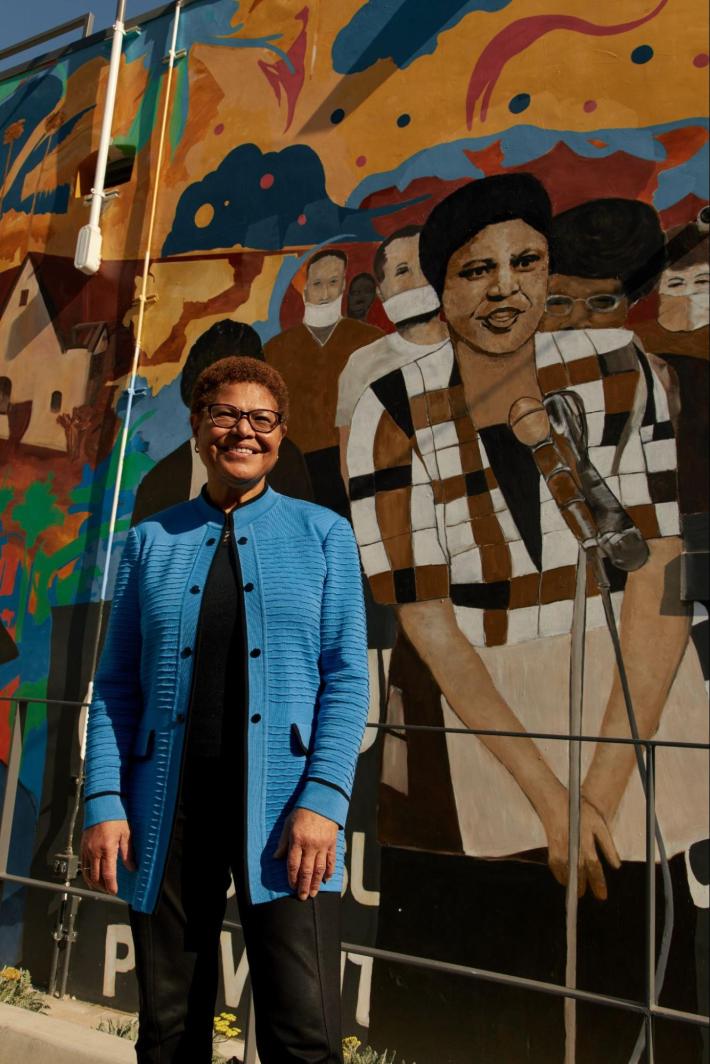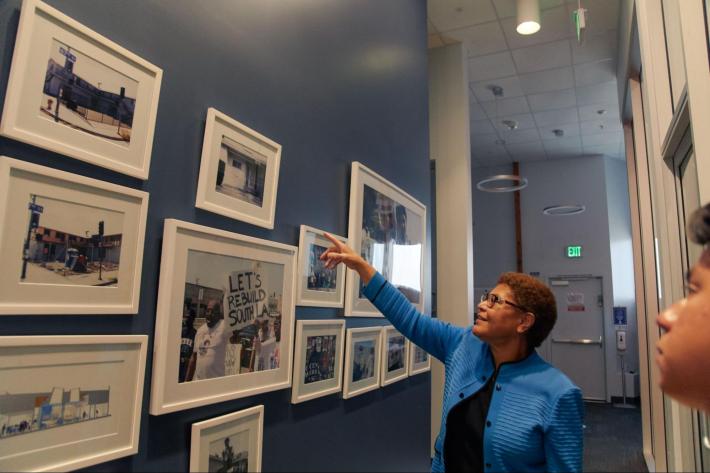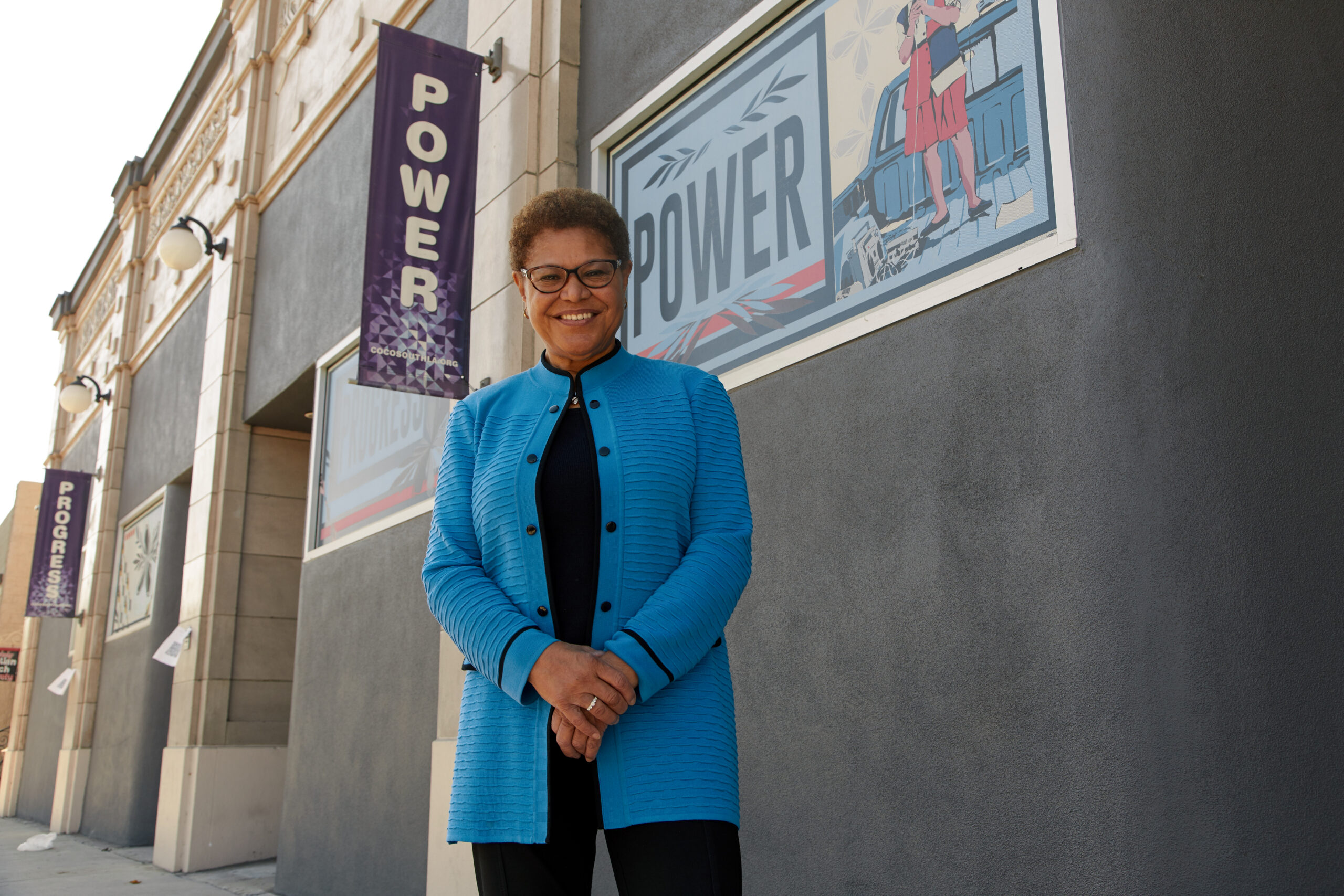Welcome to the mayoral candidate edition of L.A. TACO Votes! As L.A.’s primary election comes up in June, we will bring you street-level interviews and features with L.A.’s frontrunner mayoral candidates.
SOUTH CENTRAL, LOS ANGELES - As a Congresswoman, Karen Bass needs to live between Los Angeles and Washington D.C. She also, however, continuously lives between the past and the future. After telling L.A. TACO that solving homelessness was her priority in her mayoral race, she alludes to the Project Room key effort to house unhoused people saying that together with other organizers and community leaders: “[they] tried to take the hotels back in the 90s, in the 90s!” While Estelle Lawton became the acting Mayor in 1915 and the “first woman to be Mayor in Los Angeles,” if elected, Karen Bass could not only become the first woman elected to one of the most influential and most prominent cities in the world but also the first Black woman to do so. The primary election for this race is in June.
The congresswoman says she has known this possibility of serving her city for decades or, arguably, her whole life. In the offices of the Community Coalition, the organization she co-founded and left to develop long-term leadership, L.A. TACO talked last fall about the 90s, her roots and legacy in South Central, her international world views, and how all of this is the reason she wants to lead Los Angeles to fix its generational curses in the upcoming election to replace LA Mayor Eric Garcetti.

The former physician’s assistant went from founding and leading the Community Coalition during what she calls “the third world organizing era” to being a force in the California State Assembly from 2005 to her election to Congress in 2011 through the present, where she is currently the chairwoman of the Congressional Black Caucus. With more than 28 percent of her sponsored bills centered on international issues- the congresswoman has a unique track record of caring for global problems. When asked about the concern that she may have been gone for too long, she leans back on her track record throughout the last three decades.
In an era of post-pandemic, post-Trump, and renewed Obama-like neoliberal discourse, it can be easy to overlook the importance of the Mayor in Los Angeles and what their decisions will have in the daily lives of Angelenos. However, the importance and influence of the mayor depend on who it is. Throughout the last six years, we’ve seen mayors across the country use their position and influence to improve people's lives in their cities. The concept of states and local rights, a historically conservative political response to “big government,” was turned on its head in response to the Trump administration.
When former President Donald Trump was inaugurated, a wave of sanctuary state resolutions and ordinances erupted across the country. State governors and mayors proposed these. In Stockton, California, Mayor Michael Tubbs garnered national news for experimenting with a universal basic income program that gave a select number of Stockton residents $500 a month with no strings attached. A program that was criticized but worked.
In an LA Times debate, Bass stood out as the candidate who would take law enforcement away from sweep scenarios and would declare a state of emergency on her first day to address the issue.
Some would argue that the Democratic Party is the inevitable graveyard of radical political principles. In the last two years, we’ve seen a rash push back to more progressive winning campaigns, from the failed recall campaigns of Governor Newsom to the local effort to recall Nithya Raman. Take a short trip through the other nominees for mayor. You’ll find a developer, a city attorney, a career legislator, two former cops, and a congresswoman. High-profile seats like the mayor have teeth and influence, but as theLAnd magazine has written, developing a strong coalition across the council will have an impact.
When asked what issue she sees as a priority, the Congresswoman named housing and homelessness: “I think the fact that [the people] have moved to the affluent parts of town is what has caused the sea change,” she tells L.A. as we discuss what happened in Echo Park last year and the criminalization of poverty. In an LA Times debate, Bass stood out as the candidate who would take law enforcement away from sweep scenarios and would declare a state of emergency on her first day to address the issue.

The Congresswoman is an avid reader, biker, and grounded optimist who was surprised when her family became excited at her plans to run. Before candidates start asking for money, endorsements, and support, most run polls. Two years ago, people in Los Angeles were already nudging the congresswoman as the potential VP running mate for Biden. As 2021 started, the polls did too.
“At first, I didn’t want to run, but the questions kept pouring in.”
With such a national profile with her legacy, Bass is in her prime and choosing the role she wants. For the congresswoman, heading back home full time is the job she truly desires.
Regarding her commitment and the possible change she can bring to Los Angeles, Bass stands out as a candidate who knows the roots of the various problems that continue to plague the city. Yet, she is grounded in research and experience in the bold steps she wants to take if elected.
She tells me she doesn’t sit around thinking of her next office, “At first, I didn’t want to run, but the questions kept pouring in.”
In her office, there are photos of her leading marches in the 90s, where history echoes on the walls. But also true is that her legacy can come with more complicated questions, a larger receipt pile to question, and mattresses to turn over. When asked about the Youtube and Tiktok generation of organizers and movements, she leans in to tell me about the first thing she loved about the activism around her, the act of study and reflection.
She paints me a picture: the Vietnam war is raging, civil rights leaders come and visit South Central, and her parents and peers, however, the first they remind her to do is to hit the books. She glows when she tells me how interconnected her politicization became, how she saw the work happening during the civil rights movement connected to the history she was reading and how deep reflection is still a part of her life’s work.







